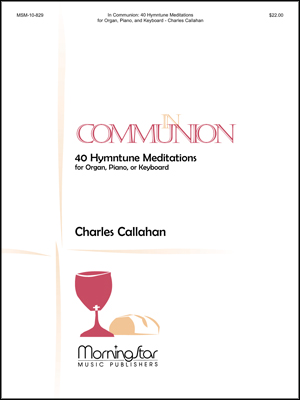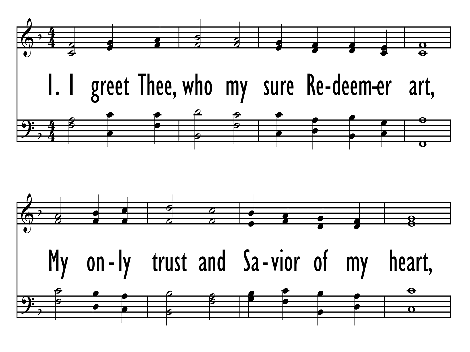Scripture References:
st.1 = Isa. 12:2, Isa. 40:1-2
st.2 = Luke 1: 78-79, Isa. 60:20
st.3 = Acts 17:28
st.4 = Eph. 4:3
The strong text of "I Greet My Sure Redeemer" features many themes suitable to various times and places of Christian worship – indeed, to all Christian living: Jesus is my Redeemer, whom I love (st. 1); Jesus is King of kings and Lord of lords (st. 2); Jesus lives in us and enables us to live (st. 3); Jesus is our model for personal growth and community (st. 4); Jesus is revealed in the Scriptures (st. 5).
The original French text, 'Je te salue, mon certain Redempteur," was published in the 1545 Strasbourg edition of Clement Marot's Psalms and appears to be a Protestant version of the Roman Catholic hymn "Salve Regina." The French text was later printed in Opera, volume 6 of an 1868 edition of John Calvin's works, and has been attributed to Calvin himself. However, modern scholars such as Pierre Pidoux have found no real proof for Calvin's authorship, and Calvin (unlike Luther) left no heritage of adapting Roman Catholic texts. The translation (1868) is mostly the work of Elizabeth L. Smith; it was published in Philip Schaff's Christ in Song (New York, 1869).
Elizabeth Lee Allen Smith (b. Hanover, NH, 1817; d. New York, 1898) was the daughter of the theologian, college president, and hymn writer William Allen (who published his Psalms and Hymns in 1835). In 1843 she married Henry Boynton Smith, who served on the faculty of Union Theological Seminary in New York City (1850-1877). Well-versed in various languages, she traveled with her husband in Europe in 1869, where he sought to recuperate from physical and mental collapse. Writer of her husband's memoirs, she also inherited an interest in hymnody from her father and translated hymns from German and French.
Smith's translation of this text came to eight stanzas in the same meter as the French original (10 10 666 666) and began with the words "I greet Thee, who my sure Redeemer art." It is not known who condensed the text to fit the 10 10 10 10 meter found in modern hymnals. The stanzas in the Psalter Hymnal are adapted from Smith's first five stanzas.
Liturgical Use:
Many occasions in Christian worship.
--Psalter Hymnal Handbook


 My Starred Hymns
My Starred Hymns







